Sepia Saturday challenges
bloggers to share family history through old photographs.
This week’s Sepia Saturday photo prompt of a library full
of boys reading inspired me to take a good look at some old textbooks passed
down from my great-grandfather and grandfather.
 |
| Literature and history books belonged to my grandfather. The little math book belonged to my great-grandfather. |
WALTER’S
ARITHMETIC BOOK
My great-grandfather proudly wrote his name on several pages
of his arithmetic book. “Walter B. S. M.
Davis.”
But he was not the first to use it. The inscription “A. N. Davis” suggests at least
one older brother of the 15 Davis children used the book too: Amaziah Nathaniel.
The book was Ray’s Practical Arithmetic, Part Third. The Ray’s series was one of the most
respected textbooks of its day because it emphasized “real life” math that
students could apply to practical pursuits of running a farm, a business, a
household, even a grocery store. Early
on the series was praised for beginning with the basics using concrete items
like blocks and marbles in order to prepare students to be able to visualize
the abstract later on when higher level critical thinking was required. Ray’s almost
exclusive use of word problems is credited with improving students’ reading
comprehension.
 |
| This textbook is very unappealing by today's standards. No colorful charts. Very little "white space." |
Dr. Ray believed education could help students develop high
moral character. So his math problems
often showed honest men and women hard at work plowing fields, planting and
harvesting crops, building, buying and selling, being generous and sharing
their goods.
Look at some typical math problems:
Look at some typical math problems:
- If 16 men build 18 rods of fence in 12 days, at the same rate, how many men can build 72 rods in 8 days?
- When cloth costs $4.37 ½ per yard, at what price per yard must it be sold to gain 33 1/3 percent?
- What is the value of 1 pound 3 pennyweights of gold ore at 3 cents a grain?
Although Dr. Joseph Ray died in 1855, his arithmetic
books are still in use today, especially among homeschoolers. However, I’m not sure how the homeschoolers
feel about the explanation of pints, barrels, and hogsheads required in beer
measurements. But I must admit, the explanation of
apothecary measurements could be helpful to today’s drug dealers who might need
to know how to answer this one:
- What will 1 pound 1 dram 1 ounce of opium cost at 4 cents a scruple?
ORVIN’S HISTORY
BOOK
I don’t know how much American history was included in my high school history textbooks, but only once did we make it to World War II. How far did the teachers of my grandfather Orvin Davis get exposing him to American history?
I don’t know how much American history was included in my high school history textbooks, but only once did we make it to World War II. How far did the teachers of my grandfather Orvin Davis get exposing him to American history?
His book is about the size of a 5”x7” photograph and just
about ¾” thick. The last chapter is
entitled “The Reconstruction Period
1865-1890.”
I guess there’s something to be said for being born early.
I guess there’s something to be said for being born early.
ORVIN’S
LITERATURE BOOK
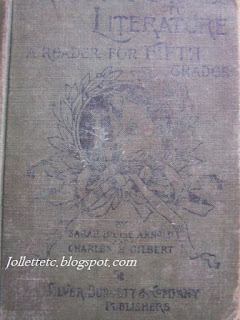 Stepping Stones to
Literature: A Reader for Fifth Grades is one ambitious collection of works
by such people as Nathaniel Hawthorne, William Cowper, Sir Walter Scott,
Elizabeth Barrett Browning, and John Ruskin.
JOHN RUSKIN!!! Has anyone read
Ruskin? I have. Hopefully my grandfather at age 10 was
exposed to some lighter weight Ruskin than I got in graduate school. Good grief.
Stepping Stones to
Literature: A Reader for Fifth Grades is one ambitious collection of works
by such people as Nathaniel Hawthorne, William Cowper, Sir Walter Scott,
Elizabeth Barrett Browning, and John Ruskin.
JOHN RUSKIN!!! Has anyone read
Ruskin? I have. Hopefully my grandfather at age 10 was
exposed to some lighter weight Ruskin than I got in graduate school. Good grief. 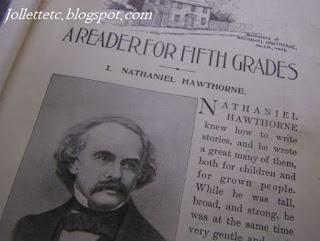
The introduction to the book says it all: “…its authors aimed to include nothing but good literature …. The tendency of the day is to scrappy reading. It is fostered by newspapers, periodicals, and compendia of literature; and it is hoped that these Readers will help to combat this unfortunate tendency, and lead to the reading of good books.”
As textbooks always do, this one gives teaching
suggestions, especially on ways to improve oral reading. The authors are not shy about saying
Americans have poor speech habits and “disagreeable voices.” They deem it a “national defect.” They even recommend calisthenics to improve
students’ carriage, breathing through the nostrils, drilling for proper
enunciation, using a dictionary to assure proper pronunciation, and learning to
incorporate the right inflections to express the feeling of the written
word.
So noble. But
these are fifth graders.
Here is what fifth graders did to their books even in 1910:
The message has been erased for the most part, but it says, "Look on page [?] and you will see my sweethearts name."
Flipping pages, I found this on page 25:
On page 300, there's this message saying "She ran away from me and nobody knows where she is."
So who was she, for crying out loud?? Hrmph. I thought books held the key to all knowledge. What a let-down.
Flipping pages, I found this on page 25:
On page 300, there's this message saying "She ran away from me and nobody knows where she is."
So who was she, for crying out loud?? Hrmph. I thought books held the key to all knowledge. What a let-down.
Looking closely at these very old books (over 100 years
old) makes me rethink the rural one-room schoolhouse. I always assumed those poor kids probably got
a second-rate education because the school couldn’t afford to do any
better. But I see now that Rockingham
County and Page County in Virginia provided the best textbooks to be had in their day.
Stand up straight, breathe through your nostrils, and
turn the page to Sepia Saturday where you can read more about books and
libraries, with feeling, of course.


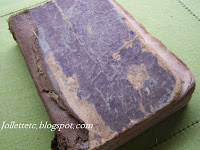

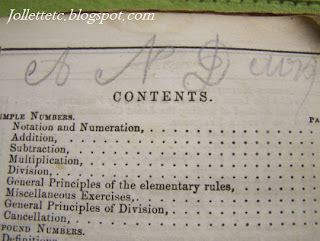
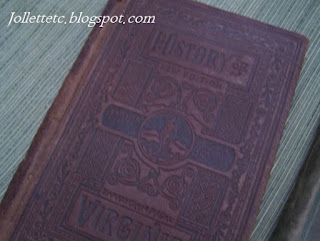
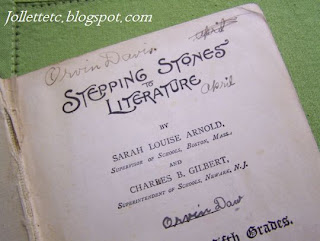

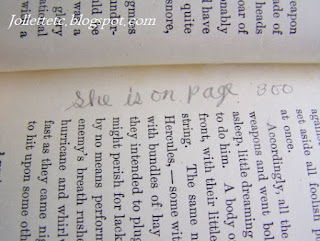
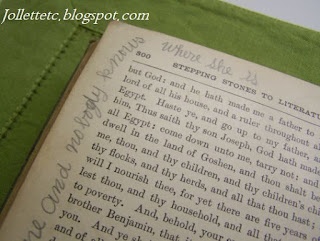
Ahhh, one of my favorite things - old books! I am always picking them up at antique and used book stores. How wonderful to own these books that were used by your grandfather and great-grandfather, a real treasure. I loved the little notes written on pages 25 and 300 - I guess kids have always written nonsensical things in their textbooks!
ReplyDeleteThe books are indeed a sweet connection to the past.
DeleteWendy, these are so cool! What a treasure these must be to your family.
ReplyDeleteUgh! Word problems! Not my favorite thing. And it looks from the silly notes in the books that kids are basically the same no matter the era.
Now, had you been raised on Ray's Arithmetic, word problems would have been second nature to you. Honestly, I always dreaded them too!
DeleteWe have some of those old readers, too. I love looking at them! What a cute little mystery in your book. :)
ReplyDeleteI was glad for that little mystery. Before I found it, I thought all I could say in this post would be, "Here are their books."
DeleteThose books got a lot of use. It's amazing that they weren't discarded long ago. They probably had very few books back then, and once the books had been saved for a long time already, it would have seemed a shame to get rid of them.
ReplyDeleteYou might be right. And of course, now we can't get rid of them either.
DeleteAwww, I wanted to see the name. What nice hand writing he had.
ReplyDeleteYeah, not finding a name was a huge disappointment. And I agree, Walter, Amaziah, and Granddaddy all had nice handwriting.
DeletePriceless pieces you have here. Makes for a very interesting post.
ReplyDeleteI enjoyed it.
QMM
Thanks so much!
DeleteHa! I often get a good laugh from your writing and I got a couple here. These really are priceless for all the reasons you pointed out.
ReplyDeleteI'm glad you got a chuckle.
DeleteWell, it might be practical math, but oh, what a different era in which it was applied!
ReplyDeleteLearned something new from you today, Wendy. I always knew John Ruskin as Victorian Britain's premier art critic. I had no idea he was such a prolific writer.
I'm sure whatever I read of Ruskin was something related to art criticism. Major snooze.
DeleteWendy; such fine old books; the personal notes make it so more precious. Children were certainly not as pampered as they are today.
ReplyDeleteWendy, you are a very good tusitala!
School was serious business. Many people did not complete high school, so they had to make the most of their education while they had the chance.
DeleteThese old books are a unique find these days. I have some of those too (reading primers and hand-me-down textbooks) and often browse the pages from time to time, for the memories during my elementary years. Math books are a different matter to me, I get queasy with the subject and I still wonder why ;) Thanks for sharing!
ReplyDeleteIt never occurred to me to save my textbooks, but it's interesting having my grandparents' books.
DeleteSame here. I loved spelling and vocabulary tests, reading quizzes, even memorizing history facts. But math - ugh. Now I use it to figure out how much wallpaper and to subtract a big number from a little number in my checkbook.
ReplyDeleteRuskin? Yikes, I remember him, too, from a college lit course -- clear as mud, as far as I'm concerned. Was not unhappy to leave him behind! Great post, Wendy!
ReplyDeleteYeah, I had to put Ruskin out of my mind too. When I saw the name in Granddaddy's book, I had to double check to make sure it was the same guy.
DeleteThose old school books have mede me search our book cases to see what we have accumulated. I can only go back to the 1940s with some reading books.Latin books (not mine) from the 1960s are heavily annotated but no intriguing messages like those in yours. A fascinating post, Wendy.
ReplyDeleteI recall translating between the lines in my Latin book from high school. I'm sure I went back and erased everything before turning it back in (we didn't buy our books then).
DeleteNow you made me wonder why I discarded my own math books... Probably cause I didn't write any romance there. (Oh Caroline, meet me under the diagonal of the cube next to the parallelepipedon on p. 124.)
ReplyDeleteAnyhow, it's good you kept them!
Such a pity. Nothing says "romance" like a parallelepiped.
DeleteMarvelous books! I love the math problems.
ReplyDeleteThose math problems were fun to read, especially with the units of measure we don't typically use (like hogsheads!). Wouldn't parents flip out over figuring the cost of opium!
DeleteWonderful assortment of old books which absolutely show that perhaps educational techniques were not all so bad back then. I did not even think about the old books, I have a couple one on geography, it is limited too. I got a kick out of the girlfriend lead on. Nice post and treasred books.
ReplyDeleteI agree. Back then education was "no nonsense," I guess. No one expected education to be "fun," just important.
DeleteWhoop Whoop...well done for the Sepia Saturday Book Theme! You have given new meaning to Book Work and a lesson in following a clue to a dead end. For sure Orval's history book would be the first one I'd read for the slant on the Civil War which probably depended on if it was written by a Yankee or a Southerner.
ReplyDeleteReally interesting post. Thanks for sharing your ancestors books, it's obvious you have inherited their wit and talent with words.
The Civil War account is the absolute truth, written by a Virginian and published in Lynchburg, just a couple miles from Appomattox. No slant at all. Nope. None.
DeleteOh I just love the old books. And the mysterious message is just perfect. I feel I should write such things in the margin of books so that generations to come will be mystified by the meaning. But how do you write in the margin of a Kindle?
ReplyDeleteHang in there. I'm sure highlighting and notating on the Kindle are on the horizon. And if not, I'm sure whatever writings I've left behind will still mystify people.
DeleteA beautiful essay, Wendy. I bet the book pages have that lovely musty aroma too. Kind of like forest mushrooms. And I wish I had known of Amaziah 24 years ago when we were testing names for our son. It has a mystic quality.
ReplyDeleteIf you like "Amaziah," you might also be swayed by another brother's name: Zephaniah. For a girl, how about Zibiah Saloma? Whew -- my 2G grandparents had to think of 15 names, and they thought of some doozies. Not a Michael in the bunch!
DeleteWhat a joy to read this post and the excerpts as well! You had me smiling and laughing and remembering notes passed to my best friend in the 6th grade. And I do remember HIS name but since he may still be out there somewhere ....
ReplyDeleteAnother mystery name leaving us in the lurch!
DeleteThese old books are wonderful. Education ain't what it used to be.
ReplyDeleteMy father used to write little notes in his prayer books during mass - mostly comments about the weather, but after he died, we found those little comments very precious.
It is fun finding those silly little scribblings. In some ways, they don't say much or mean much, but at the same time they mean everything.
DeleteWhat an enjoyable reading
ReplyDeleteand I love how you found modern applications to Ray's series.
Some things never grow old!!
:)~
HUGZ
Ray's word problems sound very much like today's word problems (although I'm not sure we use some of those units of measure anymore - I've never encountered grains and scruples in a math class). It's interesting that he "invented" this way of teaching.
DeleteJust discovered this blog through Jana's Genealogy round up -- what a fun piece. And I learned a new fact, that a "scruple" was an apothecary's measurement. And here I thought drug dealers had no scruples...
ReplyDeleteFinally - you have made my day! I was going to make a little joke about drug dealers having no scruples, but I thought, Naw, let a reader have some fun with that. And nobody did. It's nice to meet another punster. Thanks for visiting!
Delete